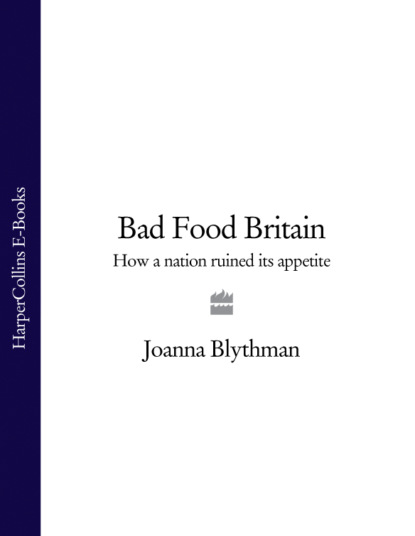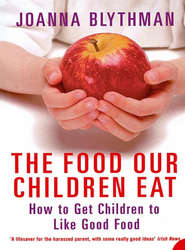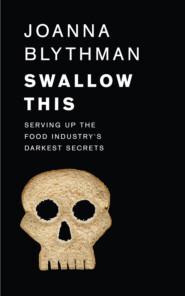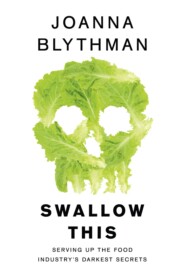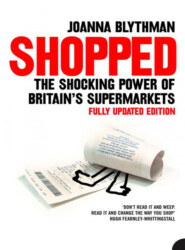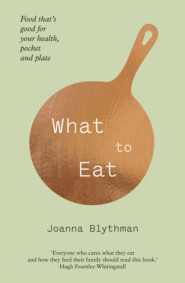По всем вопросам обращайтесь на: info@litportal.ru
(©) 2003-2024.
✖
Bad Food Britain: How A Nation Ruined Its Appetite
Настройки чтения
Размер шрифта
Высота строк
Поля
Bad Food Britain: How A Nation Ruined Its Appetite
Joanna Blythman
Award-winning investigative food journalist, Joanne Blythman turns her attention to the current hot topic – the state of British food.What is it about the British and food? We just don’t get it, do we? Britain is notorious worldwide for its bad food and increasingly corpulent population but it’s a habit we just can’t seem to kick.Welcome to the country where recipe and diet books feature constantly in top 10 bestseller lists but where the average meal takes only eight minutes to prepare and people spend more time watching celebrity chefs cooking on TV than doing any cooking themselves, the country where a dining room table is increasingly becoming an optional item of furniture. Welcome to the nation that is almost pathologically obsessed with the safety and provenance of food but which relies on factory-prepared ready meals for sustenance, eating four times more of them than any other country in Europe, the country that never has its greasy fingers out of a packet of crisps, consuming more than the rest of Europe put together. Welcome to the affluent land where children eat food that is more nutririonally impoverished than their counterparts in South African townships, the country where hospitals can sell fast-food burgers but not home-baked cake, the G8 state where even the Prime Minister refuses to eat broccoli.Award-winning investigative food journalist Joanna Blythman takes us on an amusing, perceptive and subversive journey through Britain's contemporary food landscape and traces the roots of our contemporary food troubles in deeply engrained ideas about class, modernity and progress.
BAD FOOD BRITAIN
JOANNA BLYTHMAN
DEDICATION (#ulink_a0da2101-b5c9-59b1-9c4a-cf91be3fccce)
For Derek Cooper
CONTENTS
Cover (#u45fc3cf5-954f-588e-b8c5-e13b85afa2cc)
Title Page (#u882ceb52-4212-5daf-b116-8c22cdc0042b)
Dedication (#ulink_60693d32-6c65-5d1d-8d15-01fc7b5a2eb1)
Introduction (#u7aefb0cb-bb57-5e8f-87b4-87c209299bf4)
Bad Food Britain in Numbers (#ua5cdb24d-76b4-521e-802d-748c001fc688)
Britain’s Top 10 Bad Food Beliefs (#u73a6bc80-a9db-5d01-8308-1dac548f95dc)
1 Fantasy food (#u2fd6b9fb-4e0d-565d-ae38-51bcb7259ef5)
2 How others see us (#ua1bf26be-cc7e-5147-bcd1-1edf4bafcb2e)
3 Brit food (#u84990acd-6826-5c02-91b8-06fbff5396b3)
4 Renaissance restaurants (#ufae1d4f8-fbcc-5673-8131-e4518b6e0b30)
5 No time to cook (#ufc0bbda0-f364-5898-9638-f6548b111931)
6 Disappearing dinner tables (#litres_trial_promo)
7 ‘This is not just food …’ (#litres_trial_promo)
8 Good food is posh (#litres_trial_promo)
9 Lawful prey (#litres_trial_promo)
10 We hate shopping (#litres_trial_promo)
11 Fear of food (#litres_trial_promo)
12 The yuck factor (#litres_trial_promo)
13 Safety first (#litres_trial_promo)
14 Kids in white coats (#litres_trial_promo)
15 Kiddie food (#litres_trial_promo)
16 Britain makes you fat (#litres_trial_promo)
17 ‘No bad food …’ (#litres_trial_promo)
Index (#litres_trial_promo)
Acknowledgements (#litres_trial_promo)
About the Author (#litres_trial_promo)
Also by the Author (#litres_trial_promo)
References (#litres_trial_promo)
Copyright (#litres_trial_promo)
About the Publisher (#litres_trial_promo)
INTRODUCTION (#ulink_1d840aba-efad-5b9f-b54a-b61516aaeb81)
One afternoon in early 2006, my phone rang. It was a fellow journalist looking for quotes for an article he was writing about the significance of Britain’s doyenne of food writers, Elizabeth David. “Was it thanks to her that we have become a nation of foodies?’ he wanted to know. The next morning, the Today programme on Radio 4 was repeating a story about how sales of olive oil in Britain were now outstripping those of all other cooking oils put together, a phenomenon attributed to Britain’s increasing sophistication in food taste – yet another manifestation of the nation’s much-vaunted food revolution.
Nation of foodies! Food revolution! Who are we kidding? British eating habits are getting worse, not better. In reality, Britain is second only in notoriety to the United States in the bad food stakes. Of course, this flies in the face of the perceived wisdom that we are in a ‘You’ve Never Had It So Good’ phase of British gastronomy, in the throes of a dynamic food renaissance. After all, isn’t London’s restaurant scene the envy of the rest of the planet? What about all the farmers’ markets, regional food festivals, and new artisan food products that are popping up left, right and centre, the length and breadth of the land? And how about our regiment of chef celebrities? Isn’t cool Food Britannia a runaway success? At last, after all those decades of cringing on the world food stage, surely we can now strut our stuff with conviction, and show off our new-found gastronomic credentials.
This is how Britain likes to see itself nowadays, as a fully functioning, participatory food culture. In truth, this vision is a chimera, an unconvincing construction built and talked up by the media, the chattering classes, the hospitality, tourism and food industries, and TV chefs on the make. It is a delusion that selectively ignores the gaping discrepancies that don’t fit the story:
• Our growing incompetence in the domestic kitchen and the endangered status of home cooking – surely one of the most telling indicators of a nation’s culinary health.
• Our inability to feed our children on a diet of life-sustaining, healthy food, either at home or at school.
• The stifling of an independent local grocery sector or small food commerce under the hulking boot of supermarket monoculture.
• Our addiction to industrial techno-foods.
• Our growing resistance to devoting any time to food shopping or preparation.
• Our unwillingness to take the time to eat a meal.
• Our bulging waistlines.
• Our city centres studded with chain eateries and ‘gastropubs’ where everything on the menu comes straight out of a lorry into the freezer, and from there to the microwave or deep-fat fryer.
• Our near dependence on foreign cuisines because of the weakness of our own native one.
Joanna Blythman
Award-winning investigative food journalist, Joanne Blythman turns her attention to the current hot topic – the state of British food.What is it about the British and food? We just don’t get it, do we? Britain is notorious worldwide for its bad food and increasingly corpulent population but it’s a habit we just can’t seem to kick.Welcome to the country where recipe and diet books feature constantly in top 10 bestseller lists but where the average meal takes only eight minutes to prepare and people spend more time watching celebrity chefs cooking on TV than doing any cooking themselves, the country where a dining room table is increasingly becoming an optional item of furniture. Welcome to the nation that is almost pathologically obsessed with the safety and provenance of food but which relies on factory-prepared ready meals for sustenance, eating four times more of them than any other country in Europe, the country that never has its greasy fingers out of a packet of crisps, consuming more than the rest of Europe put together. Welcome to the affluent land where children eat food that is more nutririonally impoverished than their counterparts in South African townships, the country where hospitals can sell fast-food burgers but not home-baked cake, the G8 state where even the Prime Minister refuses to eat broccoli.Award-winning investigative food journalist Joanna Blythman takes us on an amusing, perceptive and subversive journey through Britain's contemporary food landscape and traces the roots of our contemporary food troubles in deeply engrained ideas about class, modernity and progress.
BAD FOOD BRITAIN
JOANNA BLYTHMAN
DEDICATION (#ulink_a0da2101-b5c9-59b1-9c4a-cf91be3fccce)
For Derek Cooper
CONTENTS
Cover (#u45fc3cf5-954f-588e-b8c5-e13b85afa2cc)
Title Page (#u882ceb52-4212-5daf-b116-8c22cdc0042b)
Dedication (#ulink_60693d32-6c65-5d1d-8d15-01fc7b5a2eb1)
Introduction (#u7aefb0cb-bb57-5e8f-87b4-87c209299bf4)
Bad Food Britain in Numbers (#ua5cdb24d-76b4-521e-802d-748c001fc688)
Britain’s Top 10 Bad Food Beliefs (#u73a6bc80-a9db-5d01-8308-1dac548f95dc)
1 Fantasy food (#u2fd6b9fb-4e0d-565d-ae38-51bcb7259ef5)
2 How others see us (#ua1bf26be-cc7e-5147-bcd1-1edf4bafcb2e)
3 Brit food (#u84990acd-6826-5c02-91b8-06fbff5396b3)
4 Renaissance restaurants (#ufae1d4f8-fbcc-5673-8131-e4518b6e0b30)
5 No time to cook (#ufc0bbda0-f364-5898-9638-f6548b111931)
6 Disappearing dinner tables (#litres_trial_promo)
7 ‘This is not just food …’ (#litres_trial_promo)
8 Good food is posh (#litres_trial_promo)
9 Lawful prey (#litres_trial_promo)
10 We hate shopping (#litres_trial_promo)
11 Fear of food (#litres_trial_promo)
12 The yuck factor (#litres_trial_promo)
13 Safety first (#litres_trial_promo)
14 Kids in white coats (#litres_trial_promo)
15 Kiddie food (#litres_trial_promo)
16 Britain makes you fat (#litres_trial_promo)
17 ‘No bad food …’ (#litres_trial_promo)
Index (#litres_trial_promo)
Acknowledgements (#litres_trial_promo)
About the Author (#litres_trial_promo)
Also by the Author (#litres_trial_promo)
References (#litres_trial_promo)
Copyright (#litres_trial_promo)
About the Publisher (#litres_trial_promo)
INTRODUCTION (#ulink_1d840aba-efad-5b9f-b54a-b61516aaeb81)
One afternoon in early 2006, my phone rang. It was a fellow journalist looking for quotes for an article he was writing about the significance of Britain’s doyenne of food writers, Elizabeth David. “Was it thanks to her that we have become a nation of foodies?’ he wanted to know. The next morning, the Today programme on Radio 4 was repeating a story about how sales of olive oil in Britain were now outstripping those of all other cooking oils put together, a phenomenon attributed to Britain’s increasing sophistication in food taste – yet another manifestation of the nation’s much-vaunted food revolution.
Nation of foodies! Food revolution! Who are we kidding? British eating habits are getting worse, not better. In reality, Britain is second only in notoriety to the United States in the bad food stakes. Of course, this flies in the face of the perceived wisdom that we are in a ‘You’ve Never Had It So Good’ phase of British gastronomy, in the throes of a dynamic food renaissance. After all, isn’t London’s restaurant scene the envy of the rest of the planet? What about all the farmers’ markets, regional food festivals, and new artisan food products that are popping up left, right and centre, the length and breadth of the land? And how about our regiment of chef celebrities? Isn’t cool Food Britannia a runaway success? At last, after all those decades of cringing on the world food stage, surely we can now strut our stuff with conviction, and show off our new-found gastronomic credentials.
This is how Britain likes to see itself nowadays, as a fully functioning, participatory food culture. In truth, this vision is a chimera, an unconvincing construction built and talked up by the media, the chattering classes, the hospitality, tourism and food industries, and TV chefs on the make. It is a delusion that selectively ignores the gaping discrepancies that don’t fit the story:
• Our growing incompetence in the domestic kitchen and the endangered status of home cooking – surely one of the most telling indicators of a nation’s culinary health.
• Our inability to feed our children on a diet of life-sustaining, healthy food, either at home or at school.
• The stifling of an independent local grocery sector or small food commerce under the hulking boot of supermarket monoculture.
• Our addiction to industrial techno-foods.
• Our growing resistance to devoting any time to food shopping or preparation.
• Our unwillingness to take the time to eat a meal.
• Our bulging waistlines.
• Our city centres studded with chain eateries and ‘gastropubs’ where everything on the menu comes straight out of a lorry into the freezer, and from there to the microwave or deep-fat fryer.
• Our near dependence on foreign cuisines because of the weakness of our own native one.





